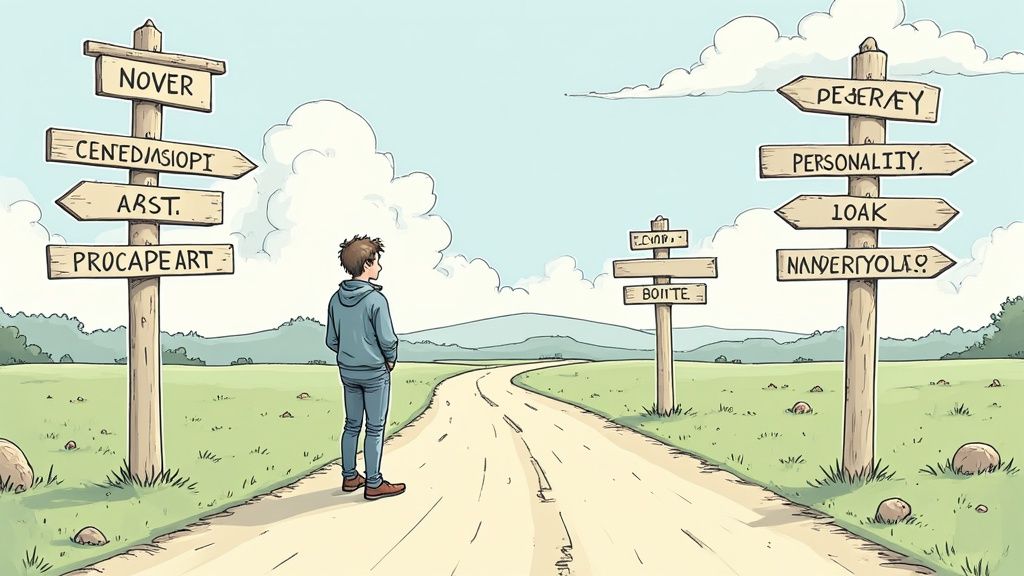From Introvert to Influencer: A Complete Guide to Developing a Personality


Understanding Your Authentic Starting Point

Building a strong personality starts with understanding who you are today. This means taking an honest look at your existing qualities, including both strengths and areas for improvement. While self-reflection is essential, it's important to approach it with kindness rather than harsh judgment. Let's explore practical ways to map your current personality and identify growth opportunities constructively.
Identifying Your Core Traits
The first step is to identify your core traits - the fundamental aspects of who you are. Consider questions like: Do you gain energy from social interactions or quiet time alone? Are you drawn to examining details or seeing the big picture? Do you prefer structure or flexibility in your daily life? Understanding these basic preferences helps explain how you naturally engage with the world around you.
Recognizing Your Natural Tendencies
Your natural tendencies shape how you respond to situations and make decisions. For example, if you're naturally empathetic, you might find yourself drawn to roles where you can help others. If you have strong analytical skills, you may excel at solving complex problems. These tendencies aren't right or wrong - they're simply part of who you are. Knowing them helps you work with your strengths while managing potential blind spots.
Pinpointing Opportunities for Growth
Once you understand your core traits and tendencies, you can identify meaningful areas for growth. This isn't about completely changing who you are. Instead, focus on building new skills that complement your authentic self. For example, a quiet person might work on public speaking, while an analytical thinker might develop their emotional awareness. Recent data from the UK shows why personal growth matters - between March 2022 and March 2023, overall life satisfaction decreased while anxiety increased. Learn more in this UK National Wellbeing Report.
Measuring Your Progress
Personal development is an ongoing journey that benefits from regular progress checks. Focus on concrete changes in your behavior and mindset rather than just feelings. Ask yourself: Are your communications more effective? Do you handle challenges with greater ease? Are your relationships deeper and more meaningful? These specific indicators help track real growth. Regular assessment allows you to adjust your approach and stay motivated as you work toward your goals.
Mastering Emotional Intelligence in Real-World Situations

Building a well-rounded personality starts with understanding and developing emotional intelligence (EQ). This vital skill helps you grasp and control your emotions while understanding those of others around you. Let's explore how you can apply EQ in everyday situations to grow as a person.
Understanding and Managing Your Emotions
The core of EQ begins with knowing yourself. When you can accurately identify your emotional state and see how it affects your thoughts and actions, you gain valuable self-awareness. For example, recognizing stress early allows you to take action before it impacts your relationships with others. This kind of emotional self-management helps build a stronger character.
Recognizing and Influencing the Emotions of Others
A key part of personal growth is developing social awareness - the ability to read and respond to others' emotions effectively. Picture meeting a friend who seems troubled. By picking up on their emotional state, you can offer meaningful support and strengthen your bond. This skill in positively affecting others' emotions is essential for building relationships.
Practical Applications of Emotional Intelligence
EQ has real benefits in daily life. At work, it helps handle tough conversations, build team trust, and solve conflicts. In personal life, it creates deeper connections and better understanding between people. Mental health statistics show the importance of emotional awareness - in England, 8 in 100 people experience mixed anxiety and depression weekly. Find more information here.
Developing Emotional Agility
Life presents constant emotional challenges that require quick adaptation. Emotional agility means handling these challenges effectively and bouncing back from setbacks. This includes acknowledging feelings without getting stuck in them, learning from experiences, and finding healthy ways to process emotions. Being emotionally agile shows maturity and personal growth.
Building Resilience Through Emotional Intelligence
A strong personality includes resilience - the ability to handle stress and difficulties. EQ plays a key role here. Understanding and managing emotions helps you face challenges without feeling overwhelmed. This means developing healthy coping strategies, asking for help when needed, and focusing on solutions instead of problems. Building resilience helps you handle life's ups and downs while continuing to grow as a person.
Building Social Skills That Feel Natural

Developing a personality means actively engaging with others in meaningful ways. Rather than forcing uncomfortable small talk, focus on building genuine connections and relationships that enrich your life and help you grow as a person.
Reading Social Cues
Good communication starts with understanding the subtle signals people send. Social cues include body language, facial expressions, and tone of voice. For instance, when someone leans in while talking, they're likely interested in the conversation. Crossed arms often indicate discomfort or defensiveness. Learning to spot and interpret these signals helps you respond appropriately and create better connections with others.
Mastering Non-Verbal Communication
Your body language and facial expressions say a lot about you. Making natural eye contact, keeping an open posture, and matching others' energy helps build trust. The key is letting these behaviors flow naturally rather than forcing them. Start small by practicing one skill at a time until it becomes second nature. This organic approach helps you develop authentic social skills that reflect your true personality.
Building Confidence in Social Contexts
Real confidence comes from accepting yourself and believing in your ability to connect with others. You don't need to be the loudest or most outgoing person - find ways to express your authentic self, whether through thoughtful listening or sharing your unique perspective. Begin with familiar situations where you feel at ease, then slowly expand your comfort zone. This builds natural confidence without pretending to be someone you're not.
Adapting Your Approach While Maintaining Authenticity
Strong communicators know how to adjust their style for different situations while staying true to themselves. You might interact differently with coworkers than with close friends, but your core values remain consistent. Being flexible while maintaining authenticity creates space for meaningful connections across various social settings.
Overcoming Social Anxiety
Many people face social anxiety, but managing it doesn't mean changing who you are. Focus on developing practical coping strategies like deep breathing, positive visualization, or working with a counselor. Remember that growth takes time - celebrate small victories and be patient with yourself. What matters is steady progress toward feeling more comfortable in social situations while remaining authentic.
Professional Environments and Personal Growth

The workplace serves as a dynamic training ground for personal development. Each day brings meaningful interactions and challenges that can shape who you become. By viewing your job as more than just a paycheck, you can use it strategically to grow into your best self.
Building Leadership Presence
You can develop leadership abilities regardless of your current role. Take initiative by volunteering for challenging projects, contributing thoughtful ideas in meetings, and practicing confident decision-making. These experiences help build presence and influence while staying true to your authentic style.
Developing Executive Communication Skills
Clear communication drives both personal and professional success. The workplace offers endless chances to improve - from active listening in meetings to delivering impactful presentations and writing persuasive emails. Learning to adapt your communication style for different colleagues and situations helps build stronger relationships and clearer understanding.
Growing Through Professional Relationships
Quality workplace connections create opportunities for personal growth through mentoring, peer feedback, and team projects. A supportive professional network allows you to take smart risks and try new approaches. Research shows personal development matters, with 81% of UK workers rating it as important. Learn more about these findings here.
Aligning Career and Personal Goals
Personal growth and career progression work best when aligned. Match your professional path with the traits you want to develop. For example, if you aim to build empathy, seek roles focused on client relationships or team leadership. This intentional approach turns daily work into meaningful personal development.
Staying Authentic at Work
As you grow professionally, maintain your core values and identity. Share your views respectfully, set healthy boundaries, and make choices aligned with your principles. True authenticity builds trust while ensuring sustainable personal development. Focus on becoming an enhanced version of yourself rather than a different person entirely. When professional growth integrates with authentic personal development, it creates lasting positive change.
Crafting Your Personal Development Investment Strategy
Building your personality requires careful planning and smart resource allocation. With so many self-improvement options available - from books to courses to coaching - it's important to develop a clear strategy. Let's explore how to create an effective personal development plan that gives you the best results.
Evaluating the ROI of Development Tools
Just like financial investments, personal growth investments need thoughtful consideration. Consider the concrete benefits different resources provide - a weekend workshop might give quick inspiration, while ongoing coaching offers sustained guidance and accountability. Books provide solid knowledge but only work if you actively apply their lessons. Compare costs, time commitments and potential gains to find options matching your resources and aims.
Creating a Personalized Development Plan
Personal development works best when customized to your specific needs. Think about how you learn most effectively - some people thrive in group settings while others prefer one-on-one coaching. Some grasp concepts best through reading, others through direct experience. Ask yourself: What specific improvements do I want to make? Which learning formats help me retain information? How can I make development a natural part of my daily life?
Aligning Resources With Your Learning Style
Knowing your learning preferences helps you pick effective development tools. Visual learners often do well with video courses and interactive workshops. Those who learn by listening may prefer podcasts and audiobooks. Hands-on learners typically benefit from practical exercises and role-playing. Match resources to your style to improve your engagement and memory retention.
The Growing Market of Personal Development
More people are investing in their personal growth, especially in the UK. The personal development market there is expected to reach $1031.64 million by 2031, with a CAGR of 5.37%. For more detailed data, see this market research report. These numbers show growing recognition of personal development's value.
Measuring Your Progress and Adapting Your Strategy
Track your development progress regularly. Notice changes in your behaviors and mindset. Check if you're meeting your goals. This helps you adjust your approach when needed. If a book isn't connecting with you or a program isn't delivering expected value, be ready to try different methods. Staying flexible with your development strategy leads to better long-term results.
Sustaining Long-Term Personality Development
Making lasting changes to your personality requires ongoing dedication and a thoughtful approach. This journey involves creating sustainable habits, working through challenges, and adjusting your methods as you grow. Let's explore practical ways to make meaningful changes while remaining authentic to yourself.
Building Habits That Stick
Creating lasting personality changes depends on developing consistent habits. Focus on one specific trait or skill at a time rather than trying to change everything at once. For example, if you want to become a better communicator, start by practicing active listening for 5-10 minutes each day. Small, consistent actions lead to significant changes over time.
Navigating Setbacks and Maintaining Momentum
Growth rarely follows a straight line. When setbacks occur, view them as learning opportunities rather than failures. For instance, if a presentation doesn't go as planned, take time to identify specific areas for improvement. Each challenge provides valuable feedback that helps refine your approach and builds resilience.
Staying True to Your Core Values
As you develop new traits and abilities, regularly check in with your authentic self. Ask yourself: "Does this change feel natural to me?" and "Does it align with what matters most?" This self-reflection helps ensure your growth enhances rather than overshadows your true personality. Authenticity should guide your development journey.
Measuring Your Progress
Track concrete changes in your behavior to gauge your progress. For example, if working on being more assertive, keep a simple log of times you expressed your opinion clearly in meetings. Focus on specific, observable actions like:
- Number of times you spoke up in groups
- Instances where you set clear boundaries
- Situations where you shared feedback constructively
Adjusting Your Approach
Long-term growth requires flexibility in your methods. If certain techniques aren't working, try new approaches. Some effective strategies include:
- Finding an accountability partner
- Joining relevant workshops or groups
- Reading books on specific traits you want to develop
- Practicing through role-play scenarios
For additional guidance and resources on your personality development journey, visit Coaching Hub.